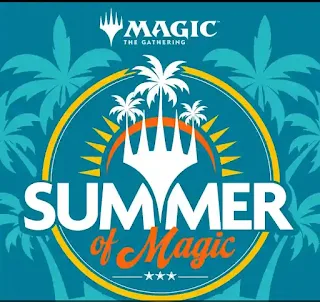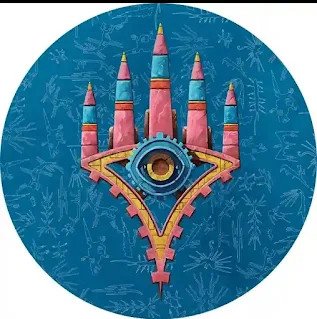How to play Magic the Gathering ( Basic guide)
 |
| Magic the gathering |
Magic: The Gathering (MTG) is a collectible card game that involves strategic deck building and tactical gameplay. Here's a detailed overview of how to play:
Objective:
The main goal is to reduce your opponent's life total from 20 to 0 using a deck of cards.
Setup:
Each player needs a deck of at least 60 cards, including lands (which produce mana) and spells (which do various things).
Players start with a hand of seven cards.
Turn Structure:
A turn consists of phases: untap, upkeep, draw, main phase 1, combat, main phase 2, and end step.
Players begin their turn by untapping all tapped (used) cards, then proceed through each phase.
Mana:
Players use lands to generate mana, the resource needed to cast spells.
Mana comes in different colors, corresponding to the colors of the cards in your deck.
Casting Spells:
Spells have a mana cost, indicated by symbols on the card. To cast a spell, pay the required mana.
Creatures, sorceries, instants, enchantments, and artifacts are common spell types.
Creatures:
Creatures are summoned to the battlefield and can attack your opponent or defend against attacks.
Each creature has power (damage dealt in combat) and toughness (amount of damage it can take).
Combat:
Combat consists of declaring attackers, declaring blockers, and then resolving damage.
Creatures with flying or other abilities may have special rules during combat.
Life Total:
Players start with 20 life. Damage from creatures, spells, or abilities reduces life total.
If a player's life total reaches 0, they lose the game.
Drawing Cards:
Players draw one card at the beginning of their turn, except for the first turn.
Some spells or abilities also allow drawing extra cards.
Winning the Game:
Besides reducing your opponent's life to 0, there are alternative win conditions in certain cards.
Deck Building:
Construct a deck with a minimum of 60 cards.
Follow deck-building rules, including a maximum of 4 copies of each card (except basic lands).
Formats:
Magic has different formats with specific deck-building rules, such as Standard, Modern, and Commander.
Keywords and Abilities:
Familiarize yourself with keywords (e.g., flying, trample) and card abilities, as they impact gameplay.
Sideboarding:
In best-of-three matches, players can swap cards from their sideboard into their deck between games.
Keep Updated:
Stay informed about new sets, card interactions, and rule updates from the official Magic: The Gathering rules.
Remember, the best way to learn is by playing, so find a local game store or use online platforms to practice and enjoy the diverse and dynamic world of Magic: The Gathering.
Will playing magic the gathering improve magic skills
 |
| Magic the gathering |
Yes, playing Magic: The Gathering (MTG) regularly is one of the most effective ways to improve your skills in the game. Here's why:
Experience and Practice:
Regular play exposes you to various cards, strategies, and interactions, helping you become familiar with the game's intricacies.
Understanding Card Interactions:
As you encounter different cards and decks, you'll gain a better understanding of how they interact with each other, enhancing your strategic thinking.
Decision-Making:
MTG involves numerous decisions, from mulligan choices to in-game tactics. Practice hones your decision-making skills, teaching you when to be aggressive, defensive, or strategic.
Deck Familiarity:
Playing with a specific deck over time allows you to learn its strengths, weaknesses, and optimal plays, improving your overall proficiency with that deck.
Learning from Mistakes:
Losing or making mistakes in a game can be valuable learning experiences. Analyzing your plays and understanding why certain strategies worked or failed helps you grow as a player.
Adaptability:
Regular exposure to diverse decks and opponents teaches you how to adapt your strategy on the fly, a crucial skill in MTG.
Rule Understanding:
Continuous play enhances your understanding of the rules, ensuring you make correct decisions and avoid common mistakes.
Community and Feedback:
Engaging with the MTG community, whether at local game stores or online platforms, provides opportunities for feedback, advice, and discussions that contribute to your growth as a player.
Tournament Experience:
Participating in tournaments, whether casual or competitive, exposes you to a more structured and challenging environment, promoting skill development under pressure.
Staying Updated:
Magic is a constantly evolving game with new sets and rule changes. Regular play helps you stay updated on the current metagame and adapt your strategies accordingly.
Remember, improvement takes time, and embracing a growth mindset by learning from both victories and defeats will contribute significantly to your progress as a Magic: The Gathering player.
Can i play magic the gathering online?
Yes, you can play Magic: The Gathering online through various platforms. Here are a few popular options:
Magic: The Gathering Arena (MTG Arena):
MTG Arena is the official digital version of Magic: The Gathering. It offers a user-friendly interface, regular updates, and a variety of formats. You can download it for free and play on Windows or macOS.
Magic Online (MTGO):
Magic Online is a digital platform that closely mirrors the physical card game. It includes a wide range of sets and formats but has a steeper learning curve compared to MTG Arena. MTGO is available for Windows only.
Other Online Platforms:
Some third-party platforms and websites also allow you to play Magic online. These may have different interfaces, features, and community aspects. Examples include Magic: The Gathering Online Proxies (Cockatrice) or XMage.
Official Tournaments and Events:
Wizards of the Coast organizes official online tournaments and events through MTG Arena. Participating in these events allows you to compete with players from around the world.
Before starting, make sure your chosen platform aligns with your preferences in terms of gameplay, format availability, and community engagement. Additionally, each platform may have its own system for acquiring cards, so be sure to familiarize yourself with how cards are obtained and traded within the digital environment.
In conclusion Magic: The Gathering (MTG) is a strategic collectible card game created by mathematician Richard Garfield and published by Wizards of the Coast. Here's a detailed summary of what MTG is all about:
Card Game Basics:
MTG is played with decks of cards representing magical spells, creatures, and artifacts.
Each player starts with 20 life and aims to reduce their opponent's life total to 0.
Deck Construction:
Players build their decks using a variety of cards. A deck must have a minimum of 60 cards, and certain cards have restrictions on how many copies can be included.
Mana and Casting Spells:
Players use land cards to generate mana, the resource needed to cast spells.
Spells, which include creatures, sorceries, instants, enchantments, and artifacts, have specific mana costs that players must pay to cast them.
Creature Combat:
Creatures are summoned to the battlefield and can attack opponents or block incoming attacks.
Combat involves declaring attackers and blockers, and damage is resolved based on power and toughness.
Colors and Mana Symbols:
Cards and mana come in five colors: white, blue, black, red, and green.
Color plays a crucial role in deck construction, strategy, and card interactions.
Keywords and Abilities:
Cards may have keywords and abilities that grant special powers or effects. Examples include flying, trample, and lifelink.
Understanding these keywords enhances strategic decision-making during gameplay.
Formats and Sets:
MTG has various formats with specific deck-building rules, such as Standard, Modern, and Commander.
New sets are regularly released, introducing new cards and mechanics to keep the game dynamic and evolving.
Community and Tournaments:
Magic has a vibrant global community, with players engaging in local game stores, online platforms, and official tournaments.
Competitive play ranges from casual games with friends to high-stakes professional tournaments.
Digital Platforms:
MTG is available online through platforms like MTG Arena and Magic Online, offering digital gameplay, deck-building, and competitive events.
Story and Lore:
Magic: The Gathering has a rich multiverse with a detailed lore and storyline. The game's sets often explore different planes and characters, providing depth to the overall narrative.
Collectibility:
MTG cards are collectible, with varying rarities and values. Some cards become highly sought after for their power in gameplay or collectible appeal.
In essence, Magic: The Gathering is a dynamic and ever-evolving game that combines strategy, deck building, and a vibrant community, making it a popular and enduring card game since its inception in 1993.




.jpg)


0 Comments